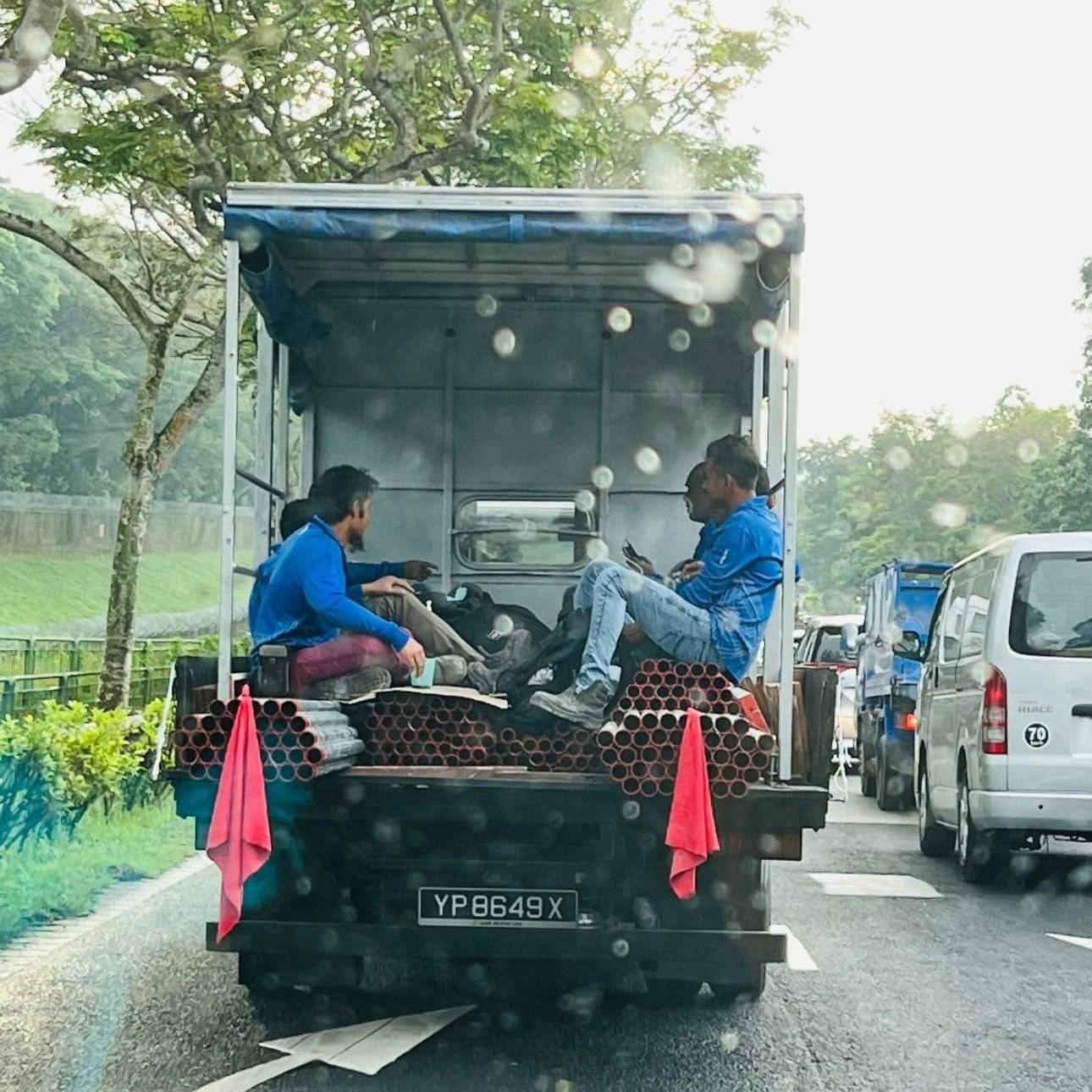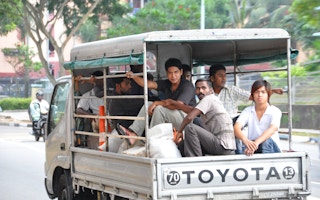The Singapore government will continue to allow workers to be transported on the back of lorries, after two road accidents in as many days last month injured dozens.
To continue reading, subscribe to Eco‑Business.
There's something for everyone. We offer a range of subscription plans.
- Access our stories and receive our Insights Weekly newsletter with the free EB Member plan.
- Unlock unlimited access to our content and archive with EB Circle.
- Publish your content with EB Premium.
The government said in a statement on Wednesday (2 August) that the practice is “not ideal”, but it understands “genuine concerns” from employers that a ban would cause.
The statement came in response to a flurry of petitions from advocacy groups campaigning for better care for the city-state’s blue-collar foreign workers, and industry groups urging careful consideration over any policy change.
It is common for Singapore’s foreign workers, many of whom are employed in the construction or marine sectors, and hailing from countries like Bangladesh, China and India, to be shuttled from dormitory to workplace via lorries.
“While all stakeholders agree on the importance of safety, there are mixed views on whether the transportation of workers in lorries should be banned,” said the government statement, which was seen as a win for businesses looking to keep costs down in their post-pandemic recovery.
Differing wants
On 18 July, 26 men were sent to hospitals after three lorries were involved in a crash on an expressway. The next day, a collision between a car and a lorry on another highway hurt 11 people. Many of the lorry passengers were migrant workers.
In response, 100 advocacy groups and individuals issued two statements last week, calling for the government to bar the use of lorries for worker transport.
One letter, addressed to Prime Minister Lee Hsien Loong and other senior politicians, asked the transport ministry for a timeline towards a ban. As it stands, workers can be ferried in the back of lorries only because of an exemption in Singapore’s road traffic act for those employed by the lorry owner or hirer.
“Our workers deserve to be transported safely, as their contributions are integral to Singapore’s growth and prosperity and their lives and continued employment are essential to their families,” the statement said.
The other statement called for an immediate ban on the practice.
“The simple fact remains that good lorries were never designed for human transport – they are not safety tested for human transport, and they violate the dignity of workers, who are exposed to heat stress and heavy rains on the road,” it said.

Workers sitting at the back of a lorry in Singapore, along with metal poles. Image: Facebook/ SGRV ADMIN.
Singapore has over a million low-wage foreign labourers, with about 40 per cent in the construction, marine and process sectors, and another quarter serving as domestic helpers.
Over 20 business groups and associations in turn wrote to senior ministers on Tuesday (1 August) about the challenges they would face should lorry transport for workers be banned. Regulatory changes could increase costs, cause project delays and put worker employment at risk, they wrote.
While larger companies have moved away from lorry transport, smaller firms find it challenging to do so, their statement said.
If workers, without lorries, turn to public transit, there could be traffic and commuter congestion, the statement added. Singapore society “must be ready to accept a change in the social compact”, it said.
The statement drew rebuke from Tommy Koh, an ambassador-at-large at Singapore’s foreign affairs ministry.
“[The business groups] are resorting to scare tactics to support their cause, warning about delays in the completion of projects and traffic congestion. The real reason for their opposition is money,” Koh wrote on Facebook.
“We should not be misled by their campaign. First, the lives of foreign workers are as precious as our own. Second, they should be treated in the same way as we treat ourselves. We require all persons to have seats and seat belts. This should be extended to our foreign workers. Third, as a First World country, we should abolish practices from the past which are incompatible with our status and reputation,” he said.
Jurisdictions such as the cities of London and Hong Kong, along with the Kingdom of Bahrain, ban worker transport on the back of lorries. The practice is allowed in Canada and the United States with safety restrictions.
Long debated issue
The issue of ferrying workers in lorries has surfaced in Singapore’s parliament several times in recent years. Lorry accidents had killed two workers and injured over 30 others in 2021.
Louis Ng, a lawmaker from the ruling People’s Action Party, had proposed a ban as recently as early last month.
On Wednesday in parliament, Ng called for a government workgroup to be formed to study the need for a timeline towards such a move.
The latest statement by the government said businesses have been encouraged to develop alternative transport arrangements and additional safety measures.
For instance, front passenger seats in lorries must already be filled up before the rear deck – which usually has no seats nor windows – can be populated. This year, new lorries are required to have rain covers, though seat belts in the back are still optional.
Fatalities involving people in lorries have dropped from six a year from 2013 to 2017, to around three over the following five years, the government statement said. Injuries are also down by a third.
Lorry passengers make up 4 per cent of annual injuries from road traffic accidents, compared to 50 per cent for motorcyclists, the statement added.
“[The government’s] efforts will remain evidence-based and focus on improving safety for all road users,” it said.
Alex Au, vice-president of migrant worker help group TWC2, said the matter is an issue of political will, in response to the government statement.
“It seems to be linked to our idea that Singapore’s competitiveness depends on having access to cheap labour and keeping the cost of social protection as low as possible,” Au said.
He added that there are “many possible pressure points” to get the government to change its thinking, including complaints from countries foreign workers come from.
“We have already made a lot of progress getting the wider [Singapore] society to understand that this is no way to transport workers. The ball is in the court of people who have a duty to exercise governance in a way that looks after human beings,” he said.










